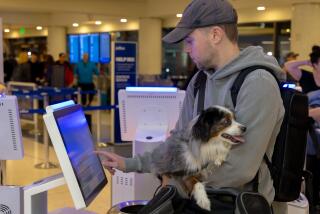Stress takes its toll
“Two weeks ago I was in Japan for a week, then I was in San Francisco for a day, and then I went to Paris for a week, and I just got back yesterday. Now here I am at work trying to figure out what day it is.”
In other words, it’s a typical Monday at the office for Tom di Maria. The 42-year-old executive director of Creative Growth Art Center in Oakland, Calif., travels 200,000 miles a year on business, mostly to Europe and Asia.
Speaking from his office, Di Maria sounded jet-lagged as he described the various travel-related stressors in his life -- fatigue, friendships taxed by his frequent work trips and missed opportunities at the office -- to name just a few.
“But mostly there’s a feeling of compressed time. Coming back today, I have quite a pile of paper mail, e-mail, faxes, people needing to meet with me,” he lamented. “Everything gets compressed and then suddenly I’m supposed to find all this time to do everything.”
A subculture of long-haul business travelers has existed in America since at least 1869, when the Transcontinental Railroad connected the coasts. Since then studies have been done on the physical health risks associated with business travel. But until recently surprisingly little research has focused on the mental toll travel takes on suit-wearing nomads like Di Maria or their loved ones.
Recent studies on this front have largely confirmed what business travelers have known all along: Business trips are often positive experiences, offering close collaborations with distant colleagues, the stimulation of different environments and a change of routine. But they are also the source of many stresses, and they often exact emotional payments from families and friends.
Bruce Merrell, a startup-company consultant and frequent flier, knows the personal costs only too well. Speaking from a cell phone recently as he waited to board a plane at San Francisco International Airport, he said his family often feels like “a fast train, and you’re trying to catch up to whatever’s going on in their lives. They’re up-to-date and you’re not, and you realize it isn’t their fault.”
Reflecting on his relationships with his two sons, both of whom are now in college, he said, “The children often didn’t understand why their father was away. Then, sometimes, I don’t either.”
Di Maria doesn’t have a wife or kids, but he said all his travel has had an enormous negative impact on his friendships. He said he spoke with a flight attendant while transiting the Atlantic earlier this month and soon after realized he’d had a longer conversation with this stranger than he’d had with any friend in many weeks.
“I know some flight attendants better than I know some of my friends,” he moaned.
Robert Werner, past president of Timex India and current president of Dua Consulting Inc., the U.S. arm of a New Delhi-based consulting group, flew in excess of 200,000 miles a year for more than a decade until he left Timex two years ago. The move curbed his annual jaunts to a mere 25,000 miles. As a financial officer at Timex and W.R. Grace & Co. before that, he often had to spend the month of September far from his family as he worked on budgets for the new fiscal year.
“My wife’s birthday is on the second of September and our anniversary is the 22nd of the month,” he said from his office in Wallingford, Conn. “There were many years when I was not home for either of those occasions. And, yes, that took a toll on our relationship.”
His wife, Beth Werner, hasn’t forgotten those absences. But what most upsets her is the damage his time away did to his relationships with their sons, particularly their eldest boy, Chip, who is two years out of college and temporarily living at home. Since Robert left Timex, he and Chip have spent a lot of time under the same roof.
“But they very rarely do something together,” she said recently. “It’s like the Cat Stevens song, where his father never really had time for the son and when he does, the son is too busy. If we could do it over, I’m not sure we would do it the way we did.”
Recent studies indicate that business travel anxiety has three main causes:
- The impact of travel on the family
- Cumulative fatigue
- The logistics of travel
The studies also found that as many as one in every three business travelers experiences a high level of stress before, during and after a trip.
A recent study of health insurance claims filed by World Bank employees who traveled regularly on international business trips found that they were up to three times as likely as their office-bound counterparts to use health insurance for treatment of psychological disorders. Moreover, the study found a direct correlation between the number of trips taken and the frequency of World Bank business travelers seeking mental help.
These disorders are often founded in the logistics of travel, or, as Merrell put it: “Wanting to be someplace and being afraid that you’re not going to be able to get there on time and having no control over the situation. It’s the mother of stress.”
For example, a traveler might worry that a flight will be delayed or that a suitcase containing business attire will arrive at the wrong airport and won’t be returned in time for a meeting with important clients.
Chris Garvey, managing director of the nonprofit Starbright Foundation, a national children’s charity based in Los Angeles, knows delayed- and canceled-flight anxiety well. Garvey takes three or four business trips a month and loathes the arbitrary nature of flight delays, lost baggage and the prices attached to airline tickets.
“On Thursday I’m going to and from Kansas City for a 3:30 meeting,” she said. “My plane is supposed to arrive at 12:50, and that should allow more than enough time. But twice in the last four months when going to Kansas City the flights were messed up and I missed two meetings. So I’m thinking I really should go Wednesday night. But to go on Wednesday night for a 3:30 meeting is not a good use of time.”
Experts call this “pretrip stress.” It’s a common malady. About as common, Garvey might say, as the sexist flight attendants who irritate her every time she uses one of her coveted upgrade points to fly business class.
“A man in a business suit and a woman in a business suit means two different things,” Garvey observed. “A man in a business suit means that he needs The Wall Street Journal and The Financial Times; a woman in a business suit means ‘maybe she’s flying with her boss or something.’ Heaven forbid a woman might want to read a Wall Street Journal.”
It doesn’t end with newspapers. Who gets the “Coffee, tea or juice” question first? The businessman. Who gets the “Would you like your coat hung up” question first? The businessman. “Come on, I know they have suits on, but so do I,” she said.
At a symposium on travel stress conducted in Washington, D.C., last year, Dr. Berhard Liese, former medical director of the World Bank, said a survey by his organization found that many business travelers dread returning from a trip and confronting the work that awaits them at the office. A survey conducted by marketing research firm Roper Starch Worldwide found the same.
It’s not simply the work, but also post-trip accounting. A network TV news producer, who spoke on condition of anonymity, said he absolutely dreads completing expense reports following an assignment.
“Every time you go out of town for the company, it’s like filing a mini tax return when you get back,” he said. “In addition to the travel and the work, you have to become an accountant.”
If the news producer suffered from post-trip stress, Carren Soto probably qualified as an always-stressed traveler in her previous position as regional manager for the finance division of a leading for-profit hospital chain. She left that position specifically because she was on the road more than 90 percent of the time.
“I used to count the sequential days that I had slept in my own bed,” she said last week. “The last year I traveled I spent a total of 30 days at home in an entire year. Once I stopped traveling, I would notice that I still had anxiety on Sundays, thinking that I was about to leave and get on a plane.”
More to Read
The biggest entertainment stories
Get our big stories about Hollywood, film, television, music, arts, culture and more right in your inbox as soon as they publish.
You may occasionally receive promotional content from the Los Angeles Times.






